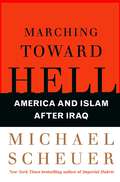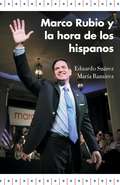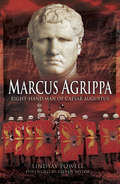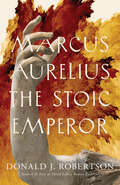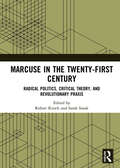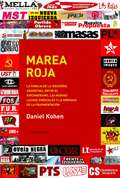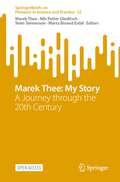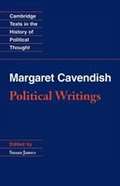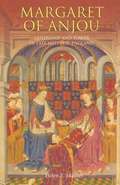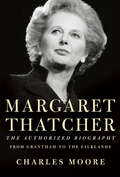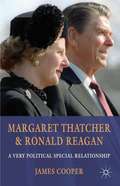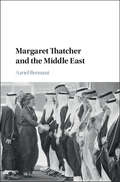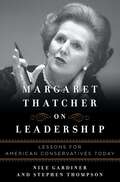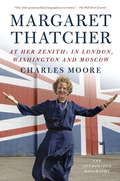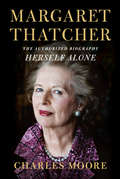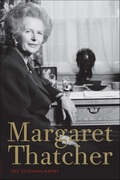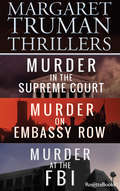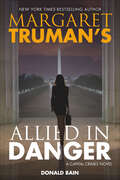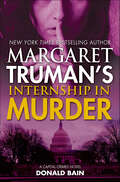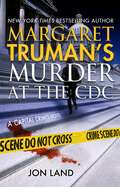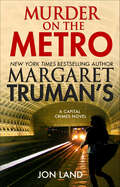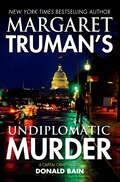- Table View
- List View
Marching Toward Hell: America and Islam After Iraq
by Michael ScheuerWhen Michael Scheuer first questioned the goals of the Iraq War in his 2004 bestseller Imperial Hubris, policymakers and ordinary citizens alike stood up and took notice. Now, Scheuer offers a scathing and frightening look at how the Iraq War has been a huge setback to America's War on Terror, making our enemy stronger and altering the geopolitical landscape in ways that are profoundly harmful to U.S. interests and security concerns. Marching Toward Hell is not just another attack on the Bush administration. Rather, it sounds a critical alarm that must be heard in order to preserve the nation's security. Scheuer outlines the ways that America's foreign policy since the end of the Cold War has undermined the very goals for which we are fighting and played right into bin Laden's hands. The ongoing instability in Iraq, for example, has provided al Qaeda and its allies with the one thing they want most: a safe haven from which to launch operations across borders into countries that were previously difficult for them to reach. With U.S. forces and resources spread thinner every day, the war has depleted our strength and brought al Qaeda a kind of success that it could not have achieved on its own. A twenty-plus-year CIA veteran, Scheuer headed the agency's Osama bin Laden unit, managed its covert-action operations, and authored its rendition program. Scheuer spent his career developing strategies to keep America safe, by any means deemed necessary by the presidents he served. It was his job to take available intelligence and devise plans to protect Americans, without considering bias, position, or even existing alliances. In Marching Toward Hell, Scheuer takes on the questions of "What went wrong?" and "How can we fix this?" and proposes a plan to cauterize the damage that has already been done and get American strategy back on track. He lists a number of painful recommendations for how we must shift our ideological, military, and political views in order to survive, even if that means disagreeing with Israeli policy or launching more brutal campaigns against terrorists. America holds its destiny in its hands, Scheuer says, yet not nearly enough has been done to defend America and destroy its Islamist enemies. This is an eye- opening, alarming, contentious, and ultimately fascinating examination of how far off track the War on Terror has gone, and a critical read in understanding what we must do to save it.
Marching to Freedom: The Story of Martin Luther King, Jr. (Famous Lives)
by Joyce MiltonA biography of the Baptist minister and civil rights leader whose practice of nonviolent civil disobedience helped African Americans win many battles for equal rights.
Marco Rubio y la hora de los hispanos
by Eduardo Suárez María RamírezMarco Rubio es el primer hispano en la historia con serias opciones de llegar a la Casa Blanca. Hijo de inmigrantes que huyeron de Cuba antes de la llegada del castrismo y que se quedaron a medio camino de hacer realidad el sueño americano, Rubio es una figura con una fuerte carga simbólica. <P><P>Su padre nunca pasó de camarero y su madre limpiaba hoteles en Las Vegas o Miami, pero Marco se interesó desde adolescente por la política escuchando a un abuelo que admiraba a Ronald Reagan. Se graduó en la universidad e hizo carrera política desde los cargos más modestos en Miami. <P> Su ascenso dentro del partido republicano tiene que ver con su capacidad retórica y su habilidad para adaptarse a cualquier situación. Llegó al Senado como uno de los favoritos del sector más conservador y poco a poco se ha ido moviendo hacia posiciones más centristas, abanderando la reforma migratoria que podría legalizar a millones de inmigrantes indocumentados. Su trayectoria simboliza de modo inmejorable el auge de la comunidad hispana, y permite retratar a la vez a un joven y ambicioso político y a la joven y ambiciosa comunidad a la que representa, para ofrecer una imagen poliédrica del país más importante del mundo y el papel que los hispanos desempeñan allí.
Marco Rubio y la hora de los hispanos
by Eduardo SuárezMarco Rubio es el primer hispano en la historia con serias opciones de llegar a la Casa Blanca. Hijo de inmigrantes que huyeron de Cuba antes de la llegada del castrismo y que se quedaron a medio camino de hacer realidad el sueño americano, Rubio es una figura con una fuerte carga simbólica. Su padre nunca pasó de camarero y su madre limpiaba hoteles en Las Vegas o Miami, pero Marco se interesó desde adolescente por la política escuchando a un abuelo que admiraba a Ronald Reagan. Se graduó en la universidad e hizo carrera política desde los cargos más modestos en Miami. Su ascenso dentro del partido republicano tiene que ver con su capacidad retórica y su habilidad para adaptarse a cualquier situación. Llegó al Senado como uno de los favoritos del sector más conservador y poco a poco se ha ido moviendo hacia posiciones más centristas, abanderando la reforma migratoria que podría legalizar a millones de inmigrantes indocumentados. Su trayectoria simboliza de modo inmejorable el auge de la comunidad hispana, y permite retratar a la vez a un joven y ambicioso político y a la joven y ambiciosa comunidad a la que representa, para ofrecer una imagen poliédrica del país más importante del mundo y el papel que los hispanos desempeñan allí.
Marcus Agrippa: Right-Hand Man of Caesar Augustus
by Lindsay PowellThe authoritative biography of the ancient Roman general and loyal deputy to Emperor Augustus by the acclaimed historian and author of Augustus at War. When Gaius Octavius became the first emperor of Rome, Marcus Agrippa was by his side. As the emperor&’s loyal deputy, he waged wars, pacified provinces, beautified Rome, and played a crucial role in establishing the Pax Romana—but he always served knowing that he would never rule in his own name. Why he did so, and never grasped power for himself, has perplexed historians for centuries. In this authoritative biography, historian Lindsay Powell offers a penetrating new assessment of Agrippa&’s life and achievements. Following Caesar&’s assassination, Agrippa was instrumental in asserting the rights of his friend Gaius Octavius as the dictator&’s heir, seeing him crowned Emperor Augustus. Agrippa then established a reputation as a bold admiral, defeating Marcus Antonius and Queen Cleopatra at the Battle of Actium, and ending bloody rebellions in the Cimmerian Bosporus, Gaul, Hispania, and Illyricum. Agrippa was also an influential statesman and architect. He established the vital road network that turned Julius Caesar&’s conquests into viable provinces, overhauled Rome&’s drains and aqueducts, and built the original Pantheon. Marrying Augustus&’s daughter, Julia the Elder, Agrippa became co-ruler of the Roman Empire until his death in 12 BC. His bloodline lived on in the imperial family, through Agrippina the Elder, his grandson Caligula, and great-grandson Nero.
Marcus Aurelius: The Stoic Emperor (Ancient Lives)
by Donald J. RobertsonExperience the world of Roman emperor Marcus Aurelius and the tremendous challenges he faced and overcame with the help of Stoic philosophy This novel biography brings Marcus Aurelius (121–180 CE) to life for a new generation of readers by exploring the emperor&’s fascinating psychological journey. Donald J. Robertson examines Marcus&’s relationships with key figures in his life, such as his mother, Domitia Lucilla, and the emperor Hadrian, as well as his Stoic tutors. He draws extensively on Marcus&’s own Meditations and correspondence, and he examines the emperor&’s actions as detailed in the Augustan History and other ancient texts. Marcus Aurelius struggled to reconcile his philosophy and moral values with the political pressures he faced as emperor at the height of Roman power. Robertson examines Marcus&’s attitude toward slavery and the moral dilemma posed by capturing enemies in warfare; his attitude toward women; the role of Stoicism in shaping his response to the threat of civil war; the treatment of Christians under his rule; and the naming of his notorious son Commodus as his successor. Throughout, the Meditations is used to shed light on the mind of the emperor—his character, values, and motives—as Robertson skillfully weaves together Marcus&’s inner journey as a philosopher with the outer events of his life as a Roman emperor.
Marcuse in the Twenty-First Century: Radical Politics, Critical Theory, and Revolutionary Praxis
by Robert Kirsch and Sarah SurakThis book engages the critical theory of political philosopher Herbert Marcuse to imagine spaces of resistance and liberation from the repressive forces of late capitalism. Marcuse, an influential counterculture voice in the 1960s, highlighted the "smooth democratic unfreedom" of postwar capitalism, a critique that is well adapted to the current context. The compilation begins with a previously unpublished lecture delivered by Marcuse in 1966 addressing the inadequacy of philosophy in its current form, arguing how it may be a force for liberation and social change. This lecture provides a theoretical mandate for the volume’s original contributions from international scholars engaging how topics such as higher education, aesthetics, and political organization can contribute to the project of building a critical rationality for a qualitatively better world, offering an alternative to the bleak landscape of neoliberalism. The essays in this volume as whole engage the current context with an urgency appropriate to the problems facing an encroaching authoritarianism in political society with an interdisciplinary lens that speaks to the complexity of the problems facing modern society. The chapters originally published as a special issue in New Political Science.
Marea roja: La familia de la izquierda argentina. Entre el Kirchnerismo, las nuevas luchas s
by Daniel KohenCon una exhaustiva investigación de fondo y un excelente modo de narrar, el autor analiza qué es hoy la izquierda y echa luz sobre los rasgos que la unifican y la fragmentan, y sobre las rememoraciones que componen su santoral. La familia de la izquierda argentina. Entre el Kirchnerismo, las nuevas luchas sindicales y la amenaza de la fragmentación. ¿Qué lugar ha ocupado la izquierda argentina en la coyuntura socio- política de la última década? Cada vez que estalla un conflicto social en nuestro país, en el centro de la escena se puede distinguir a la izquierda argentina que oscila entre las tapas de los principales diarios y el más puro ostracismo. Conflictos como el lock-out de las entidades del campo, las peleas gremiales en el subterráneo de la ciudad de Buenos Aires, las elecciones en la UBA, la crisis del 2001, la política de derechos humanos durante la administración K y el conflicto en la ex Terrabusi, solo por nombrar algunos de los hechos en los cuales la izquierda tuvo un lugar protagónico. ¿Pero cuál es su verdadero rol y su influencia?Daniel Kohen analiza e interpreta la ideología, los modosy el accionar de este actor político en los últimos convulsionados años de la Argentina, a la vez que propone un estudio de las características y los modos de operar de los más de cuarenta partidos y grupos que conforman lo que el autor llama la familia leninista.
Marek Thee: A Journey through the 20th Century (SpringerBriefs on Pioneers in Science and Practice #32)
by Nils Petter Gleditsch Marta Bivand Erdal Stein Tønnesson Marek TheeMarek Thee was a Jewish Polish journalist, scholar, and activist. This book tells his life from narrowly escaping death in the Holocaust to exile in Palestine, where he became attached to the Polish consular service. On his return to Poland in 1950, he worked for the Foreign Ministry and later for the Polish Institute for International Affairs. He served as Head of the Polish delegation to the International Control Commission in Indochina in the late 1950s. In 1968 he lost his job and his Polish citizenship in a nationalistic and antisemitic campaign. He was able to move to Norway where he worked for twenty years at the Peace Research Institute Oslo (PRIO), editing an international quarterly journal, Bulletin of Peace Proposals and doing research on the arms race. In retirement, he continued his research and writing at the Norwegian Human Rights Institute. The book vividly relates the drama of his life in Poland, Palestine, Indochina, and Norway.This is an open access book.
Margaret Cavendish: Political Writings (Cambridge Texts in the History of Political Thought)
by Margaret Cavendish Susan JamesMargaret Cavendish, Duchess of Newcastle, published a wide variety of works including poems, plays, letters and treatises of natural philosophy, but her significance as a political writer has only recently been recognised. <P><P>This major contribution to the series of Cambridge Texts includes the first ever modern edition of her Divers Orations on English social and political life, together with a new student-friendly rendition of her imaginary voyage, A New World called the Blazing World. Susan James explains the allusions made in this classic text, and directs readers to the many intellectual debates with which Cavendish engages. Together these two works reveal the character and scope of Margaret Cavendish's political thought. She emerges as a singular and probing writer, who simultaneously upholds a conservative social and political order and destabilises it through her critical and unresolved observations about natural philosophy, scientific institutions, religion, and the relations between men and women.
Margaret Of Anjou: Queenship and Power in Late Medieval England
by Helen E. MaurerMargaret of Anjou was a vengeful and violent woman, or so we have been told, whose vindictive spirit fuelled the fifteenth-century dynastic conflict, the Wars of the Roses. In Shakespeare's rendering she becomes an adulterous queen who mocks her captive enemy, Richard, duke of York, before killing him in cold blood. Shakespeare's portrayal has proved to be remarkably resilient, because Margaret's queenship lends itself to such an assessment. In 1445, at the age of fifteen, she was married to the ineffectual Henry VI, a move expected to ensure peace with France and an heir to the throne. Eight years later, while she was in the later stages of her only pregnancy, Henry suffered a complete mental collapse that left him catatonic for roughly a year and a half: Margaret came to the political forefront. In the aftermath of the king's illness, she became an indefatigable leader of the Lancastrian loyalists in their struggle against their Yorkist opponents. Margaret's exercise of power was always fraught with difficulty: as a woman, her effective power was dependent upon her invocation of the authority of her husband or her son. Her enemies lost no opportunity to charge her with misconduct of all kinds. More than five hundred years after Margaret's death this examination of her life and career allows a more balanced and detached view.
Margaret Thatcher
by Charles MooreWith unequaled authority and dramatic detail, the first volume of Charles Moore's authorized biography of Margaret Thatcher reveals as never before the early life, rise to power, and first years as prime minister of the woman who transformed Britain and the world in the late twentieth century. Moore has had unique access to all of Thatcher's private and governmental papers, and interviewed her and her family extensively for this book. Many of her former colleagues and intimates have also shared previously unseen papers, diaries, and letters, and spoken frankly to him, knowing that what they revealed would not be published until after her death. The book immediately supersedes all other biographies and sheds much new light on the whole spectrum of British political life from Thatcher's entry into Parliament in 1959 to what was arguably the zenith of her power--victory in the Falklands in 1982. Drawing on an extraordinary cache of letters to her sister Muriel, Moore illuminates Thatcher's youth, her relationship with her parents, and her early romantic attachments, including her first encounters with Denis Thatcher and their courtship and marriage. Moore brilliantly depicts her determination and boldness from the very beginning of her political career and gives the fullest account of her wresting the Tory leadership from former prime minister Edward Heath at a moment when no senior figure in the party dared to challenge him. His account of Thatcher's dramatic relationship with Ronald Reagan is riveting. This book also explores in compelling detail the obstacles and indignities that Thatcher encountered as a woman in what was still overwhelmingly a man's world. Moore's admiration for Thatcher is evident, yet his portrait is convincingly clear-eyed, conveying both how remarkable she was and how infuriating she could be, her extraordinary grasp at mastering policy and what needed to be done, and her surprising vulnerabilities. At the moment when Margaret Thatcher becomes a part of history, Moore's portrait enlivens her, compellingly re-creating the circumstances and experiences that shaped one of the most significant world leaders of the postwar era.
Margaret Thatcher and Ronald Reagan
by James CooperA new exploration of the relationship between the Margaret Thatcher and Ronald Reagan administrations in domestic policy. Using recently released documentary material and extensive research interviews, James Cooper demonstrates how specific policy transfer between these 'political soul mates' was more limited than is typically assumed.
Margaret Thatcher and the Middle East
by Azriel BermantMargaret Thatcher and the Middle East examines Thatcher's policy on the Middle East, with a spotlight on her approach towards the Israeli-Palestinian conflict. It questions claims that she sought to counter the Foreign Office Middle East policy, and maintains that the prime minister was actually in close agreement with the Whitehall bureaucracy on the Arab-Israeli conflict. In particular, the volume argues that Thatcher's concerns over Soviet ambitions in the Middle East encouraged her to oppose the policies of Israel's Likud governments, and to work actively for an urgent resolution of the conflict. Furthermore, while Thatcher was strongly pro-American, this was not translated into automatic support for Israel. Indeed, the Thatcher government was very much at odds with the Reagan administration over the Middle East, as a result of Washington's neglect of the forces of moderation in the region.
Margaret Thatcher on Leadership: Lessons for American Conservatives Today
by Stephen Thompson Nile GardinerThis inspirational and practical guide for conservatives combines stories from Lady Thatcher's life with principles and strategies conservatives can apply to their challenges today. Nile Gardiner and Stephen Thompson outline the critical lessons conservatives can learn from Lady Thatcher on articulating conservative principles to a broader audience, cutting through bureaucratic messes to achieve goals, and standing up to aggressive regimes.
Margaret Thatcher: From Grantham to the Falklands
by Charles MooreWith unequaled authority and dramatic detail, the first volume of Charles Moore's authorized biography of Margaret Thatcher reveals as never before the early life, rise to power, and first years as prime minister of the woman who transformed Britain and the world in the late twentieth century. Moore has had unique access to all of Thatcher's private and governmental papers, and interviewed her and her family extensively for this book. Many of her former colleagues and intimates have also shared previously unseen papers, diaries, and letters, and spoken frankly to him, knowing that what they revealed would not be published until after her death. The book immediately supersedes all other biographies and sheds much new light on the whole spectrum of British political life from Thatcher's entry into Parliament in 1959 to what was arguably the zenith of her power--victory in the Falklands in 1982. Drawing on an extraordinary cache of letters to her sister Muriel, Moore illuminates Thatcher's youth, her relationship with her parents, and her early romantic attachments, including her first encounters with Denis Thatcher and their courtship and marriage. Moore brilliantly depicts her determination and boldness from the very beginning of her political career and gives the fullest account of her wresting the Tory leadership from former prime minister Edward Heath at a moment when no senior figure in the party dared to challenge him. His account of Thatcher's dramatic relationship with Ronald Reagan is riveting. This book also explores in compelling detail the obstacles and indignities that Thatcher encountered as a woman in what was still overwhelmingly a man's world. Moore's admiration for Thatcher is evident, yet his portrait is convincingly clear-eyed, conveying both how remarkable she was and how infuriating she could be, her extraordinary grasp at mastering policy and what needed to be done, and her surprising vulnerabilities. At the moment when Margaret Thatcher becomes a part of history, Moore's portrait enlivens her, compellingly re-creating the circumstances and experiences that shaped one of the most significant world leaders of the postwar era.
Margaret Thatcher: In London, Washington and Moscow (Authorized Biography of Margaret Thatcher)
by Charles MooreIn June 1983 Margaret Thatcher won the biggest increase in a government's parliamentary majority in British electoral history. Over the next four years, as Charles Moore relates in this central volume of his uniquely authoritative biography, Britain's first woman prime minister changed the course of her country's history and that of the world, often by sheer force of will. The book reveals as never before how Mrs. Thatcher transformed relations with Europe, privatized the commanding heights of British industry and continued the reinvigoration of the British economy. It describes her role on the world stage with dramatic immediacy, identifying Mikhail Gorbachev as "a man to do business with" before he became leader of the Soviet Union, and then persistently pushing him and Ronald Reagan, her great ideological soul mate, to order world affairs according to her vision. For the only time since Churchill, she ensured that Britain had a central place in dealings between the superpowers. But even at her zenith she was beset by difficulties. Reagan would deceive her during the U.S. invasion of Grenada. She lost the minister to whom she was personally closest to scandal and faced calls for her resignation. She found herself isolated within her own government. She was at odds with the Queen over the Commonwealth and South Africa. She bullied senior colleagues and she set in motion the poll tax. Both these last would later return to wound her, fatally. Charles Moore has had unprecedented access to all of Mrs. Thatcher's private and government papers. The participants in the events described have been so frank in interviews that we feel we are eavesdropping on their conversations as they pass. We look over Mrs. Thatcher's shoulder as she vigorously annotates documents and as she articulates her views in detail, and we understand for the first time how closely she relied on a handful of trusted advisers to carry out her will. We see her as a public performer, an often anxious mother, a workaholic and the first woman in Western democratic history who truly came to dominate her country in her time. In the early hours of October 12, 1984, during the Conservative party conference in Brighton, the IRA attempted to assassinate her. She carried on within hours to give her leader's speech at the conference. One of her many left-wing critics, watching her that day, said, "I don't approve of her as Prime Minister, but by God she's a great tank commander." This titanic figure, with all her capabilities and her flaws, storms from these pages as from no other book.From the Hardcover edition.
Margaret Thatcher: The Authorized Biography: Herself Alone
by Charles MooreCharles Moore's masterful and definitive biography of Britain's first female prime minister reaches its climax with the story of her zenith and her fall.How did Margaret Thatcher change and divide Britain? How did her model of combative female leadership help shape the way we live now? How did the woman who won the Cold War and three general elections in succession find herself pushed out by her own MPs?Charles Moore's full account, based on unique access to Margaret Thatcher herself, her papers, and her closest associates, tells the story of her last period in office, her combative retirement, and the controversy that surrounded her even in death. It includes the fall of the Berlin Wall, which she had fought for, and the rise of the modern EU that she feared. It lays bare her growing quarrels with colleagues and reveals the truth about her political assassination.Moore's three-part biography of Britain's most important peacetime prime minister paints an intimate political and personal portrait of the victories and defeats, the iron will but surprising vulnerability of the woman who dominated in an age of male power. This is the full, enthralling story.
Margaret Thatcher: The Autobiography
by Margaret ThatcherPublished in a single volume for the first time, Margaret Thatcher is the story of her remarkable life told in her own words--the definitive account of an extraordinary woman and consummate politician, bringing together her bestselling memoirs The Downing Street Years and The Path to Power. Margaret Thatcher is the towering political figure of late-twentieth-century Great Britain. No other prime minister in modern times sought to change the British nation and its place in the world as radically as she did.Writing candidly about her upbringing and early years and the formation of her character and values, she details the experiences that propelled her to the very top in a man's world. She offers a riveting firsthand history of the major events, the crises and triumphs, during her eleven years as prime minister, including the Falklands War, the Brighton hotel bombing, the Westland affair, the final years of the Cold War, and her unprecedented three election victories. Thatcher's judgments of the men and women she encountered during her time in power-from statesmen, premiers, and presidents to Cabinet colleagues-are astonishingly frank, and she recalls her dramatic final days in office with a gripping, hour-by-hour description from inside 10 Downing Street. Powerful, candid, and compelling, Margaret Thatcher stands as a testament to a great leader's significant legacy.
Margaret Truman Thrillers: Murder in the Supreme Court, Murder on Embassy Row, Murder at the FBI (Capital Crimes)
by Margaret TrumanThese three political thrillers by the acclaimed author—and daughter of President Harry Truman—offer an insider&’s look into the dangerous shadows of D.C.Murder in the Supreme Court When Clarence Sutherland, Chief Clerk of the Supreme Court, is found dead, Lieutenant Martin Teller of the Washington Police and Susanna Pincher of the Justice Department are pulled together to find the killer.Murder on Embassy Road When a British Ambassador drops dead at his own gala, everyone suspects his Iranian valet—who has suddenly disappeared. But knowing the Ambassador&’s reputation for womanizing and shady financial deals, Washington Metro&’s Captain Sal Morizio digs deeper.Murder at the FBI FBI Agents Ross Lizenby and Christine Saksis are in a showdown with their own Bureau when they investigate the murder of a fellow agent at the J. Edgar Hoover Building. While the higher-ups want the case closed quickly, the trail leads to disturbing secrets among them.
Margaret Truman's Allied in Danger (A Capital Crimes Novel)
by Margaret Truman Donald BainPI Robert Brixton is back in Margaret Truman's Allied in Danger, Donald Bain's next installment in the New York Times bestselling Capital Crimes seriesDavid Portland works security for America’s British Embassy in London. His life is upended when his son Trevor dies mysteriously in Nigeria, while employed by a suspicious security/mercenary company known as SureSafe. One night, Portland sees a man in a bar wearing a bracelet—a family heirloom, which he had given his son—and attacks the man. The information he learns will send Portland down a rabbit-hole of deadly deception—one which he hopes will lead him to the truth about his son’s death.Meanwhile, Robert Brixton, a noted Washington DC-based international investigator, has been hired to look into a fraudulent charity and a criminal warlord in Nigeria. His life and his investigations will soon become intertwined with Portland’s probe and that of his estranged, ex-wife, Elizabeth. Their interconnected cases will take Brixton to Nigeria, into that country’s Heart of Darkness and on one of the most violent and dangerous journeys of his life.At the Publisher's request, this title is being sold without Digital Rights Management Software (DRM) applied.
Margaret Truman's Internship in Murder (A Capital Crimes Novel)
by Margaret Truman Donald BainLaura is a young intern in Washington, D.C., working for handsome and likable Congressman Hal Gannon. Laura falls for the charming Gannon, but when she catches a stewardess at Gannon's apartment, she vows to destroy him.Private investigator Robert Brixton is a former cop who has also worked for the FBI. When Laura goes missing, Brixton is hired by Laura's family to gain insight into the case that the police might have missed. Brixton tracks down rumors about Gannon-a staunchly moral "family advocate" according to his political position, but a womanizer according to gossip-but the congressman vehemently denies having anything untoward to do with Laura. Then Laura is found dead in the congressional cemetery, and many more questions are raised. . . Donald Bain thrills again with Margaret Truman's Internship in Murder, the riveting next installment in the Margaret Truman's beloved Capital Crimes series.At the Publisher's request, this title is being sold without Digital Rights Management Software (DRM) applied.
Margaret Truman's Murder at the CDC: A Capital Crimes Novel (Capital Crimes #31)
by Margaret Truman Jon LandMurder and intrigue on the steps of the United States capital building pulls Robert Brixton into his most personal case yet, in Margaret Truman's Murder at the CDC2017: A military transport on a secret run to dispose of its deadly contents vanishes without a trace.The present: A mass shooting on the steps of the Capitol nearly claims the life of Robert Brixton’s grandson.No stranger to high-stakes investigations, Brixton embarks on a trail to uncover the motive behind the shooting. On the way he finds himself probing the attempted murder of the daughter his best friend, who works at the Washington offices of the CDC.The connection between the mass shooting and Alexandra’s poisoning lies in that long-lost military transport that has been recovered by forces determined to change America forever. Those forces are led by radical separatist leader Deacon Frank Wilhyte, whose goal is nothing short of bringing on a second Civil War.Brixton joins forces with Kelly Lofton, a former Baltimore homicide detective. She has her own reasons for wanting to find the truth behind the shooting on the Capitol steps, and is the only person with the direct knowledge Brixton needs. But chasing the truth places them in the cross-hairs of both Wilhyte’s legions and his Washington enablers.At the Publisher's request, this title is being sold without Digital Rights Management Software (DRM) applied.
Margaret Truman's Murder on the Metro: A Capital Crimes Novel (Capital Crimes #31)
by Margaret Truman Jon LandIn Margaret Truman's Murder on the Metro, Jon Land's first thrilling addition to the New York Times bestselling Capital Crimes series, Robert Brixton uncovers a sinister plot threatening millions of American lives!"A roller coaster of a novel." —David Baldacci, New York Times bestselling authorIsrael: A drone-based terrorist attack kills dozens on a sun-splashed beach in Caesarea.Washington: America awakens to the shattering news that Vice President Stephanie Davenport has died of an apparent heart attack.That same morning, a chance encounter on the Washington Metro results in international private investigator Robert Brixton thwarting an attempted terrorist bombing. Brixton has no reason to suspect that the three incidents have anything in common, until he’s contacted by Kendra Rendine, the Secret Service agent who headed up the vice president’s security detail. Rendine is convinced the vice president was murdered and needs Brixton’s investigative expertise to find out why. In Israel, meanwhile, legendary anti-terrorist fighter Lia Ganz launches her own crusade against the perpetrators of that attack which nearly claimed the lives of her and granddaughter. Ganz’s trail will ultimately take her to Washington where she joins forces with Brixton to uncover an impossible link between the deadly attack on Caesarea and the attempted Metro bombing, as well as the death of the vice president. The connection lies in the highest corridors of power in Washington where a deadly plot with unimaginable consequences has been hatched. With the clock ticking toward doomsday, Brixton and Ganz race against time to save millions of American lives who will otherwise become collateral damage to a conspiracy destined to change the United States forever."Margaret Truman’s Murder in the Metro is a spectacular international thriller of intrigue and conspiracy that I could . . . not . . . put . . . down." —Mark Greaney, New York Times bestselling authorAt the Publisher's request, this title is being sold without Digital Rights Management Software (DRM) applied.
Margaret Truman's Undiplomatic Murder (Capital Crimes)
by Margaret Truman Donald BainPrivate investigator Robert Brixton has always hated Washington. Against his better judgment, he decides to stick around and take a job as an agent in a new State Department security agency headed by his former boss at the Washington P.D. After work one day he meets his youngest daughter, Janet, for a drink at an outdoor cafe. Shockingly, a young Arabic woman blows herself up, killing Janet and a dozen others. Seeking revenge for his daughter, Brixton follows the tracks of the bomber to a powerful senator's son.Brixton finds himself digging deep into what turns out to be a small but powerful cabal whose goal is to kill embassy workers from nations involved in the invasion of Iraq and Afghanistan. Donald Bain thrills again with Undiplomatic Murder, the riveting next installment in the Margaret Truman's beloved Capital Crimes series.At the Publisher's request, this title is being sold without Digital Rights Management Software (DRM) applied.
